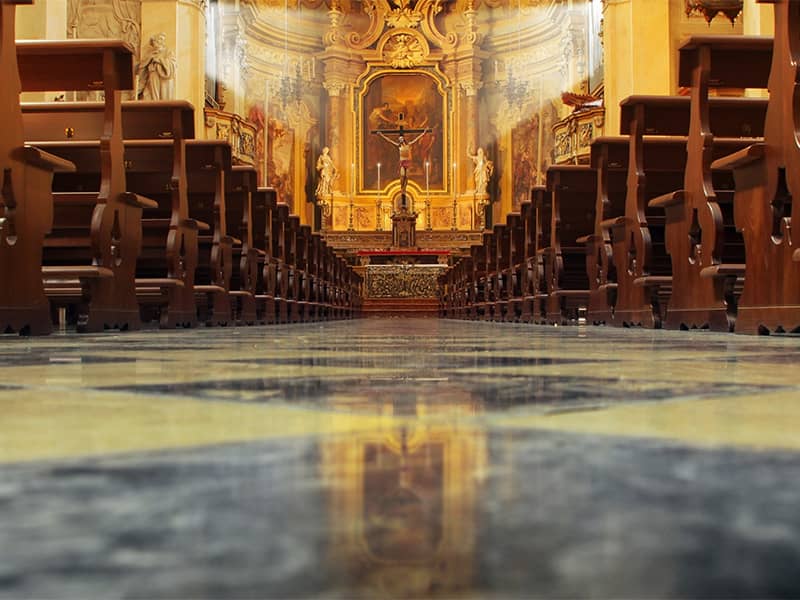The justices of the U.S. Supreme Court heard oral arguments about that question Tuesday (Feb. 26) in a case stemming from a requirement by the village of Stratton, Ohio, that the religious group and other solicitors fill out a form before approaching the homes of residents.
The Jehovah's Witnesses, who say anonymous door-to-door activity is a part of their ministry, argued the 1998 ordinance is unconstitutional because it violates free speech. They asked the high court to overturn a 6th U.S. Circuit Court of Appeals decision affirming a district court ruling saying the ordinance could be applied to the Witnesses. "It is a criminal act to go from door to door in the village of Stratton" without a permit, said Paul Polidoro, associate general counsel for the Watchtower Bible and Tract Society of New York, the headquarters for the faith group.
Chief Justice William Rehnquist questioned how the village's registration process limits Jehovah's Witnesses since the mayor is supposed to give the permit at no cost to those who apply for it. "You can't be turned down," he said.
But Justice Anthony Kennedy seemed to take a different view. "It seems troubling to me," he said. "You have to make the disclosure to the mayor" as well as to the homeowner. "We don't believe that anyone needs to go to the government to ask permission to speak to their neighbor," argued Polidoro.
Justices questioned the lawyers on either side about the specifics of who could be barred from door-to-door soliciting and whether it is wrong for a group that wishes to make such visits to have to state their cause ahead of time. Some of them attempted to ascertain how the Witnesses might differ in their door-to-door encounters from other groups.
Justice Stephen Breyer, for example, confirmed with Polidoro that the Witnesses in Stratton did not ask for money. Several justices focused on whether municipalities are justified in requiring permits for those who wish to knock on doors. "The concern may stem from a concern about preventing burglars and unfortunate incidents in the area," said Justice Sandra Day O'Connor.
Rehnquist cited recent reports about a double murder of Dartmouth College professors in which the suspects went "house to house" before determining where to commit a crime. When Polidoro said it would be "implausible" that someone would stop by city hall for a permit before committing a crime, Rehnquist said such a process would leave a "record" of those who did get a permit.
Abraham Cantor, the lawyer for the village of about 300 people, said the municipality is exerting its "police power" to deter crime by having the permitting process.
Justice Antonin Scalia questioned the wide range of people that might have to apply. "The breadth of this thing is novel to me," he said. The justices wondered how trick-or-treaters and Christmas carolers would be affected by the ordinance. "Do I have to get a permit to borrow a cup of sugar from my neighbor?" asked O'Connor.
When Cantor recited whom the ordinance included, Scalia questioned the inclusion of Witnesses in the definition. "Are they canvassers, solicitors, hawkers...?" he asked. Cantor said the ordinance is designed "to prevent annoyance of the property owner." Polidoro countered that while some might consider the Witnesses to be "obnoxious" or annoying, "our activity lies at the heart of the First Amendment." Cantor also suggested that some might go door to door under the "guise" of a seemingly harmless cause with the true intent of committing a crime. "It seems to me one of the moral risks of life," said Scalia, who questioned whether a government should make door-to-door activity "a privilege." "Should you require everyone who rings a doorbell to get fingerprinted before you ring a doorbell?"
David Gormley, the state solicitor of Ohio, who argued for the permitting process, said it gives the residents "a little greater sense of security" when an "uninvited person" enters their private property. The Witnesses have not applied for a permit, but six other groups had at the time of the district court's consideration of the case. Now, about 15 have permits, Gormley said.
Among those formally supporting the village are nine states other than Ohio, as well as the U.S. Conference of Mayors and the National Association of Counties. Groups that filed friend-of-the-court briefs supporting the Witnesses include the American Civil Liberties Union, the Independent Baptist Churches of America and the Church of Jesus Christ of Latter-day Saints.

